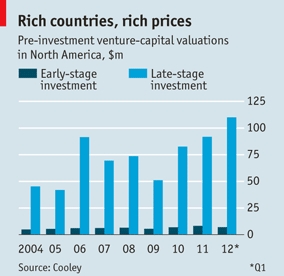風(fēng)險投資公司,是專門風(fēng)險基金(或風(fēng)險資本),把所掌管的資金有效地投入富有盈利潛力的高科技企業(yè),并通過后者的上市或被并購而獲取資本報酬的企業(yè)。風(fēng)險資本家將資金投資于新的企業(yè),幫助管理隊伍將公司發(fā)展到可以“上市”的程度,即將股份出售給投資公眾。一旦達到這一目標(biāo),典型的風(fēng)險投資公司將售出其在公司的權(quán)益,轉(zhuǎn)向下一個新的企業(yè)。
Venture capital in emerging markets
新興市場的風(fēng)險投資
VC clone home
風(fēng)投公司投資模仿者
Making money by bringing old ideas to new markets
將老點子運用至新市場來賺錢
SOME venture capitalists call it “geo-arbitrage”; others know it as “tropicalisation”. The term refers to the practice of backing start-ups that take an established business model and adapt it to an emerging market. Whatever you call it, it is becoming a bigger part of the venture-capital industry as competition at home forces Silicon Valley investors to look farther afield.
一些風(fēng)險投資者稱之為“地緣套利”;另一些則稱之為“熱帶化”。這個術(shù)語是指:對將既有商業(yè)模式運用至新興市場的新興企業(yè)進行投資。不論人們稱之為何物,由于國內(nèi)的競爭迫使硅谷投資者將目光放得更遠,這種做法在風(fēng)投行業(yè)中越來越常見了。

Julio Vasconcellos, one of the founders of Peixe Urbano, a Brazilian site offering users discounted deals, is thrilled by the “huge flood” of American investors he has noticed coming to Brazil, for instance. No wonder. Some of them, including Benchmark Capital and General Atlantic, have invested in his own company alongside Brazilian venture capitalists. The financiers have reason to be upbeat, too. Peixe Urbano is a clone of Groupon, an American start-up that went public last year; its business model is one they know can take off.
例如,巴西折扣購物網(wǎng)Peixe Urbano的其中一位創(chuàng)始人胡里奧 瓦斯康塞洛斯(Julio Vasconcellos)發(fā)現(xiàn)有大量美國投資者“涌入”巴西,為此而感到興奮。這完全不足為奇。在這些美國投資者中,包括基準(zhǔn)資本公司(Benchmark Capital)和泛大西洋投資公司(General Atlantic)在內(nèi)的一些也和巴西風(fēng)投者一樣投資了他的公司。這些投資者持樂觀態(tài)度也是有原因的。因為Peixe Urbano復(fù)制了團購網(wǎng)(Groupon)的經(jīng)營模式。團購網(wǎng)是一家去年上市的美國新興企業(yè);投資者相信其經(jīng)營模式能夠讓Peixe Urbano快速發(fā)展。











